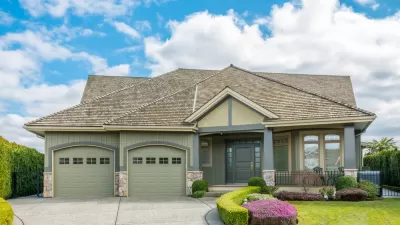A new study by the RAND corporation highlights the various benefits of expanding car-sharing nationwide. It turns out, however, that significantly reducing carbon emissions isn't one of them, writes Brad Plumer.
In analyzing the potential for growth of car-sharing in the United States, a new study (pdf) by the RAND Corporation estimates that as many as 7.5 million Americans (4.5 percent of all eligible drivers) could end up using the service in the future, up from 560,000 today. And while the RAND study authors - Keith Crane, Liisa Ecola, Scott Hassell, and Shanthi Nataraj - point out that such a shift could have significant benefits such as easing congestion, reducing the need for parking, and reducing transportation costs, they also report that the potential of such a shift to reduce energy use and carbon pollution is minimal.
"Here are the numbers: If 7.5 million Americans signed up for
car-sharing services, the RAND study estimates that greenhouse-gas
emissions from all U.S. vehicles would decline just 0.6 percent. If we
got outlandish and assumed a future in which 20.3 million Americans (or
about 12.5 percent of all eligible drivers) used car-sharing, then
emissions from light vehicles would still just drop 1.7 percent."
According to Plumer, the reason for the meager decline is due to the current driving patterns of those most be likely to use the service.
"For the most part, the people who sign up for
car-sharing services were barely driving anyway. On average, Americans
who use these sharing services see their car ownership numbers drop from
0.47 cars per household down to 0.24 cars per household. In other
words, they went from barely owning cars to barely owning cars. In
contrast, car ownership for the country as a whole is about 1.87
vehicles per household."
"Indeed, as StreetsblogDC's Tanya Snyder points out, public transportation - taking the bus or train - is a much more effective way for city dwellers to cut emissions."
Thanks to Daniel Lippman
FULL STORY: Just how big can car-sharing get?

Maui's Vacation Rental Debate Turns Ugly
Verbal attacks, misinformation campaigns and fistfights plague a high-stakes debate to convert thousands of vacation rentals into long-term housing.

Planetizen Federal Action Tracker
A weekly monitor of how Trump’s orders and actions are impacting planners and planning in America.

In Urban Planning, AI Prompting Could be the New Design Thinking
Creativity has long been key to great urban design. What if we see AI as our new creative partner?

Cal Fire Chatbot Fails to Answer Basic Questions
An AI chatbot designed to provide information about wildfires can’t answer questions about evacuation orders, among other problems.

What Happens if Trump Kills Section 8?
The Trump admin aims to slash federal rental aid by nearly half and shift distribution to states. Experts warn this could spike homelessness and destabilize communities nationwide.

Sean Duffy Targets Rainbow Crosswalks in Road Safety Efforts
Despite evidence that colorful crosswalks actually improve intersection safety — and the lack of almost any crosswalks at all on the nation’s most dangerous arterial roads — U.S. Transportation Secretary Duffy is calling on states to remove them.
Urban Design for Planners 1: Software Tools
This six-course series explores essential urban design concepts using open source software and equips planners with the tools they need to participate fully in the urban design process.
Planning for Universal Design
Learn the tools for implementing Universal Design in planning regulations.
Appalachian Highlands Housing Partners
Gallatin County Department of Planning & Community Development
Heyer Gruel & Associates PA
Mpact (founded as Rail~Volution)
City of Camden Redevelopment Agency
City of Astoria
City of Portland
City of Laramie



























